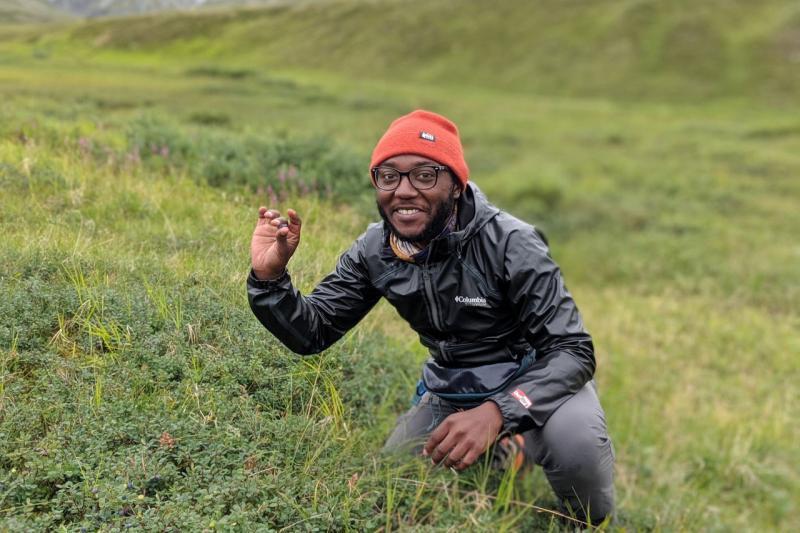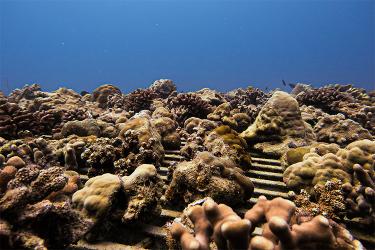Nigel Golden will present the 2020 Ambrose Jearld Jr. Lecture on Diversity and Inclusion. Golden is a doctoral candidate in environmental conservation and graduate fellow in the Northeast Climate Adaptation Science Center at the University of Massachusetts Amherst.
The event is sponsored by the Woods Hole Diversity Initiative and the Woods Hole Diversity Advisory Committee. Golden’s lecture, “Reducing Harm: A Politic to Address Institutional and Cultural Practices that Reduce Participation and Retention in STEM," will take place online on July 23 at 2:00 p.m.(EDT) via Zoom. Registration is required.
A native of Milwaukee, Golden received his bachelor of science in wildlife ecology and biology from the University of Wisconsin - Stevens Point. At the university, he cultivated his passion for conducting research in environmental conservation, and the importance of doing this work in conjunction with social justice issues.
Golden’s remarks will focus on the importance of addressing the cultural and structural barriers to full participation by marginalized communities in STEM. These barriers are intrinsic to academia as an institution. He advocates taking an active approach and acknowledging what he terms as “baked-in harm” in the system. Golden will provide a framework for addressing the systemic issues that may explain and/or address those barriers. Getting the audience thinking and talking about these issues can help move the practice from a place of “do no harm” to reducing harm.
The lecture is named in honor of longtime NOAA Fisheries employee Ambrose Jearld, Jr. for his work in making Woods Hole a more diverse, inclusive and welcoming community. Jearld retired from NOAA Fisheries Service in September 2016 after 38 years of service at the Northeast Fisheries Science Center, most recently as director of Academic Programs.
Bullard Award to be Presented During Lecture Event
Following the lecture, the 2020 John K. Bullard Award will be presented to Larry Alade for his contributions to making Woods Hole a more welcoming, inclusive and diverse community. Alade is a research scientist at the Northeast Fisheries Science Center’s Woods Hole Laboratory.
Alade was chosen for his commitment to diversity in Woods Hole through:
- His work on the Partnership Education Program (PEP)
- His leadership on the Black History Month Planning Committee
- His participation in the Woods Hole Diversity Advisory Committee, the Northeast Fisheries Science Center’s Diversity and Inclusion Team, and various other committees and programs that promote diversity and inclusion.
The award is given every 2 years and is named in honor of John Bullard. Bullard is the former president of the Sea Education Association and regional administrator for NOAA Fisheries in the greater Atlantic Region. He received the first such award in 2012 for his leadership, vision, and commitment to diversity in the Woods Hole science community and for his role in forming the Woods Hole Diversity Initiative.
High Praise for Woods Hole’s Partnership Education Program
While in college, Golden participated in the 2012 Partnership Education Program (PEP). The 10-week summer internship program brings 16 students from minority groups that are underrepresented in marine and environmental sciences to Woods Hole. The program consists of a month-long course followed by 6 - 8 weeks of research on individual projects at the science institutions in the village.
“PEP was one of the most formative experiences I had as an undergraduate student,” Golden said. “Ambrose Jearld is like my academic grandfather. He really helped mentor me and help me formulate my career path. I was surprised and honored to be asked to present a lecture named for him. I am grateful for the opportunity to share some of my own experiences and perspectives.”
Golden is a faculty member on the Woods Hole Research Center’s Polaris Project, which takes undergraduate college students to the Alaskan tundra to study environmental changes. Due to the pandemic, interactions with the project’s 10 students this summer are virtual. Students follow the same process as they would in the field. They use literature, course materials, and discussions with faculty members to propose a research question and how they would go about seeking the answer.
Golden received a 2017 National Geographic Early Career grant. He investigated the impacts of changing landscape and climate warming on Arctic species, in particular arctic ground squirrels, in Denali National Park in Alaska. He was awarded a Switzer Foundation Fellowship for 2019-2020 to continue his environmental work and his efforts to create a more diverse, inclusive, and equitable conservation movement.
As a graduate student at the University of Massachusetts, Golden co-founded the BriDGE initiative. The goal of the initiative is to increase the representation and visibility of early career scientists from underrepresented groups in departmental seminar series. Learn more about the group’s work.
Award and Lecture Background
The Ambrose Jearld, Jr. Lecture on Diversity and Inclusion is given every summer in Woods Hole by invited scholars, scientists, authors and others. The lecturers challenge the status quo to bring perspective, knowledge, and expertise to the subject of building a more diverse and inclusive community.
The John K. Bullard Diversity Award is given every 2 years on the occasion of the Jearld Lecture to recognize leadership in and commitment to making the Woods Hole scientific community more welcoming and inclusive. In years when the Bullard Award is not given, the Jearld Lecture is presented as a stand-alone event.
Participating institutions in the Woods Hole Diversity Initiative are:
- Marine Biological Laboratory
- NOAA’s Northeast Fisheries Science Center
- Sea Education Association
- U.S. Geological Survey Woods Hole Coastal and Marine Science Center
- Woods Hole Oceanographic Institution
- Woods Hole Research Center.
For more information, contact Shelley Dawicki.





